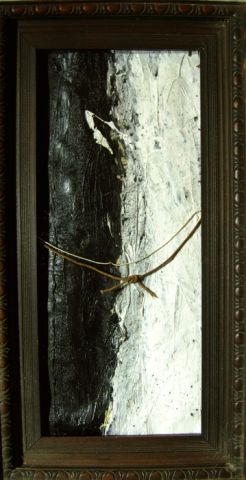The sparks, both delightful and alarming, that fly when we come into contact with others is fascinating. My week in London with my pals at Core Gallery produced both kinds – mostly the delightful kind. I think it would be impossible to trace the threads of thought surrounding the conversations which came out of that week, but they were many and complex is design. I come away fuller, richer, more intelligent and bound by deeper connections. Man! Was it good!!
I think I have found a tag for my work. First question is why should I need a tag? Well, in a way it grounds what I do and if I am to speak intelligently about my work I think it helps. I call it a ‘tag’ because I think of it in exactly that way. It does hold a certain connotation to marketability which is not entirely comfortable and it also pins the work to a certain context. That, for me at any rate, is a bit more acceptable, but I can see for many, that too would be uncomfortable. I use the word ‘tag’ because of these slightly negative connotations; to ignore them would be to ignore the reality of the efforts I make to sell my work.
The tag I’ve found is postconceptual painting. Perhaps nothing new in that term, but it does seem to be coming into its own in terms of use. I understand this term in two ways: first, as Graham Crowley wrote in his curatorial statement for the 2008 exhibit Precious Things at Highlanes Gallery, Drogheda, County Louth, Ireland, http://grahamcrowley.blogspot.com/2010/11/precious-things-2008.html
http://www.highlanes.ie/Activity.aspx?ActivityID=44
Referred to as post-conceptual painting, the work presented here acknowledges the legacy of conceptual art in a similar way that painting embraced cubism a century ago. This is an important issue. Too often the relationship between painting and conceptual art is wrongly presented as polarised or irreconcilable, but the approach here doesn’t dictate stylistic orthodoxy; on the contrary, it is characterised by diversity and pluralism.
Graham Crowley
And secondly, as an umbrella term for painting since 1980:
The “death of painting” and its subsequent resurrection in transformed conditions is a leitmotif of the modern era. Painting’s postconceptual resurgence at the start of the 1980s began a dramatic expansion of its field. If painting remains important today, it is because its contradictions have been acknowledged as artists have radically diversified the components of its production and presentation.
From the publisher’s synopsis of ‘Painting’ by Terry R. Meyers
http://mitpress.mit.edu/catalog/item/default.asp?ttype=2&tid=12475
For my purposes, postconceptual fits my work because I am attempting to merge the abstraction of Late Modernism and the context of Conceptualism. (It’s okay, you can tell me I’m being ambitious – I am.) As I said recently to my friend Annable Tilley, Late Modernism, specifically Abstract Expressionism, was incomplete because the self had no context, or rather its only context was itself, and Conceptualism was all about context but effaced the self. What will painting look like that attempts to merge the two? And why should it be important to merge the two? Perhaps my painting is what painting would look like if the two were merged, someone else I believe, will have to answer that question. It is important, I think, to merge the two because the ‘bigger picture’ of the reality of society today demands a fuller truth of our experience. Humanity confronts the dehumanizing effects of classification in all areas of existence. The social safety net we have become accustomed to in society is eroding. When we realize it fully, where is that going to place us?
I use gesture to symbolize the self, the individual. Up to this point I have explored the idea of the self in relation to the influence of the outside forces of a generalized time-based context. Perhaps now I need to look at how the ‘thought as media’, and the context and classification of Conceptualism may affect self as I have defined it in relation to time and situation. And perhaps also define the relationship of self, classified. (Gulp)

